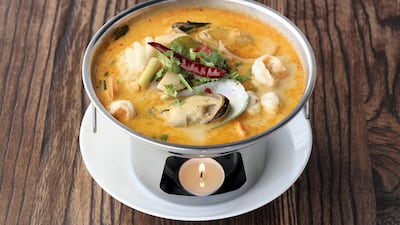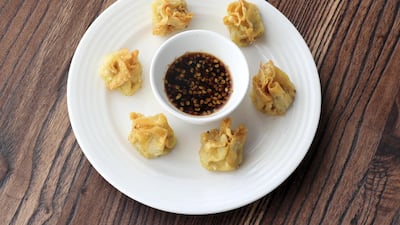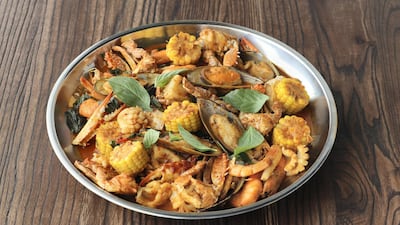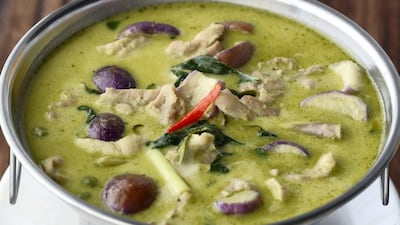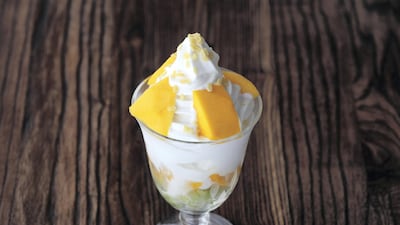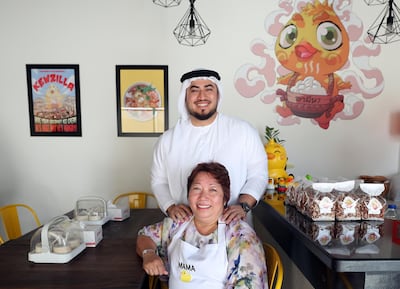It's 3pm on a Friday and customers are on a waiting list, not least for this morning's pop-up pandan-leaf-essence-infused coconut ice cream and a fresh batch of bubble tea. There's something special about Sticky Rice; people drive far and wide from around the city to this hole-in-the-wall eatery in Jumeirah Village Circle, which has all of six tables. Many of these avid foodies have to opt for takeout, and the place is crammed with crowds of people huddling at the door, while mouth-watering aromas of Thai cooking fill the air.
The story behind the restaurant is as sweet as the vegan ice creams it regularly sells out. Sticky Rice is a passion project, a union of mother and son. Mo Abedin, 32, was born in Bangkok. His Emirati father and Thai mother lived and worked there when he was a child, before returning to the UAE some years later. It was in the Thai capital that Abedin discovered his passion for cooking. It was, after all, in his blood.
From caterer to restaurateur
His mum, Amena Rakkuson, lovingly referred to by patrons as Mama, has been feeding Dubai's Thai community for the last 20 years. She began working out of the family kitchen and delivered all over the city, sometimes driving up to six hours a day to feed people who craved a taste of home. In a few years, she had 200 regular customers, who ordered everything from the spicy tom yum soup and pad Thai noodles, to other traditional dishes that take up to eight hours to make, she says. Now, everyone wants a piece of the action.
Rakkuson, who has been making meals for her family since she was nine, says it was her dream – after a lifetime of cooking – to have her own restaurant. Self-taught, she read everything she could get her hands on, and would go around the street markets of Bangkok, asking how things were made, often being shooed away by busy traders, but still learning about the ingredients and methodology for the craft that would become her calling.
“Every ingredient has a right and wrong use,” she explains, reminiscing about how she learnt to differentiate between dried and fresh herbs, reduce the bitterness of certain ingredients, and understand how much sugar is “really enough”.
When the family came to the UAE, where Abedin continued to study the Thai language and culture with his younger sister, while simultaneously immersing himself in the Emirati community. He says his growing up happened in the kitchen alongside Rakkuson, adding that there is no fusion when it comes to cooking, other than the two cultures’ shared passion for hospitality. “There’s nothing Emirati here other than lineage and bloodline,” he says. “Mama’s passion is authentic Thai food and that’s what this is.”
If it looks like a duck ...
Having said that, Abedin and Rakkuson have had some interesting battles, including one over ducks. Rubber versions of these adorn the tables and countertops, while images of the adventurous cartoon emblem Kew (a playful reference to the Thai pronunciation of “cute”) colour the walls. The theme came from Rakkuson’s love of toy ducks; she has quite the collection at home, with the motif appearing on everything from her shower curtain and slippers to ornaments and cutlery.
When Abedin, who is also Sticky Rice's designer, suggested the shop be fitted out in honour of her passion, she wasn't quite as sure, thinking that a classically Thai-style eatery might be more fitting. He disagreed. He didn't want it to look the same as any other Thai restaurant, but wanted it to represent his mama.
More recently, Abedin developed a soft-serve coconut ice cream, a new take on the Thai classic, which is frozen hard and usually cut with a curved machete. Rakkuson fought her corner to stay classic, but Abedin's version has been a hit. With pop-up flavours from hibiscus to pandan leaf essence (all extracted by hand from the long, tough, green leaf), it has become one of the family's bestsellers, after two months in the making. "Mama didn't want to sell it and once I finished it, it took her two weeks to even taste it," he says with a laugh. Seeing customers' reactions, she has since conceded that it wasn't such a bad idea, after all.
An authentic Thai food experience
While it has stayed pure to its origins, Sticky Rice always wanted to be different. “We make things you can’t get anywhere else,” says Abedin. “A lot of people try to westernise Thai cooking, but we don’t do that; we respect it.”
Accordingly, the restaurant does not use any MSG or pre-prepared ingredients; everything is made by hand without any shortcuts. The bestselling chilli paste, for example, involves hand-roasting the spices, while home-ripened mangos are flown in from Thailand for the eatery’s well-loved mango sticky rice with rich coconut milk ice cream. Deliveries, including fresh lemongrass, come in from Thailand twice weekly, of which Rakkuson says: “It works out more expensive this way, but I prefer that to using substitutes like dry lemongrass, which just doesn’t taste the same; it’s horrible.”
Traditional dishes such as hoi pad prik pow (local clams stir-fried with fresh garlic, spring onions and roasted chilli paste) and khai look khuey (golden fried eggs in a tamarind gravy topped with crispy onions, roasted dried chillies and freshly chopped coriander) and are not foods low on labour intensity. The classic curry pastes, too, require a long list of ingredients including fresh kaffir lime skin, lemongrass, the Asian root vegetable galangal, chillies, onion, coriander seeds and more.
If something is missing one week, the pair simply take it off the menu until the ingredients or herbs are available or back in season. They also prepare a three-kilogram batch of red and green curry paste (plus vegan versions minus the shrimp paste) and up to 25 litres of ice cream each day. It’s little wonder the place is heaving in just over eight months.
Abedin’s most recent development is Thai bubble tea. The small multicoloured chewy balls made of sweet potato and glutenous rice flour are coloured in-house using pandan leaf (green), carrot (yellow or orange) and pea flower (purple). The vegan offering is mixed with home-made three soya bean milk or coconut milk, and has become one of Abedin’s favourite offerings.
“When you make it yourself, the smell, the taste, it’s completely different. A lot of these things are full of chemicals and preservatives when you buy them ready-made,” says Rakkuson. “Cooking is like art. Everyone can do it, but the difference is when it’s done with the heart, with passion and with skill. It all depends on how much you’re into the food.”
